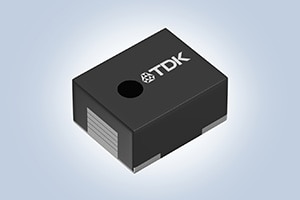
TDK Corporation (TSE:6762) has announced the introduction of its new PLEA85 series of high-efficiency power inductors developed for battery-powered wearables and other devices, improving operating times. The new series has the lowest profile* in the industry, due to the use of TDK’s newly developed low-loss magnetic material and its thin-film processing techniques. Mass production of the product series began this month, October 2023.
Measuring just 1.0 mm (L) x 0.8 mm (W) x 0.55 mm (H), the PLEA85 series enables engineers to miniaturize their design and take full advantage of low-profile ICs such as CSP. The bottom electrode and partly L-shaped form on the side makes suitable for high-density surface mounting, helps suppress misplacement during mounting and improves terminal strength to create a more robust end-product.
It is anticipated that wearable devices with increased performance and density will be developed in the future. Accordingly, demand for thinner, lighter and smaller electronic components will increase. TDK will widen its lineup of high-efficiency small-sized and low-profile inductors that will be key parts of power circuits to fulfill market needs.
Glossary
- CSP: Chip-Scale Package
- TWS: True Wireless Stereo
Main applications
- Wearable devices like true wireless stereo (TWS) earphones, hearing aids and smartwatches
- Small-sized power supply modules
Main features and benefits
- Thin-film power inductor’s proprietary low-loss metal magnetic material achieves a highly efficient power circuit
- Compact size of 1.0 mm (L) x 0.8 mm (W) x 0.55 mm (H) facilitates PCB space saving and reduce weight
| Type | Inductance [μH] |
DC resistance [mΩ] max. |
Isat [A] max. |
Itemp [A] max. |
| PLEA85DCAR47M-1PT00 | 0.47 ±20% | 120 | 0.7 | 1.0 |
| PLEA85DCA1R0M-1PT00 | 1.0 ±20% | 300 | 0.6 | 0.85 |
| PLEA85DCA2R2M-1PT00 | 2.2 ±20% | 600 | 0.4 | 0.55 |
Itemp: Current value based on temperature increase (Temperature increase of 40 °C by self-heating)
